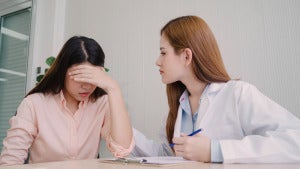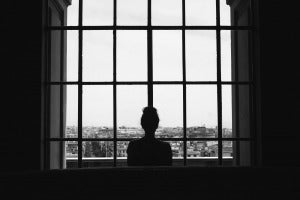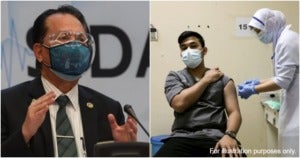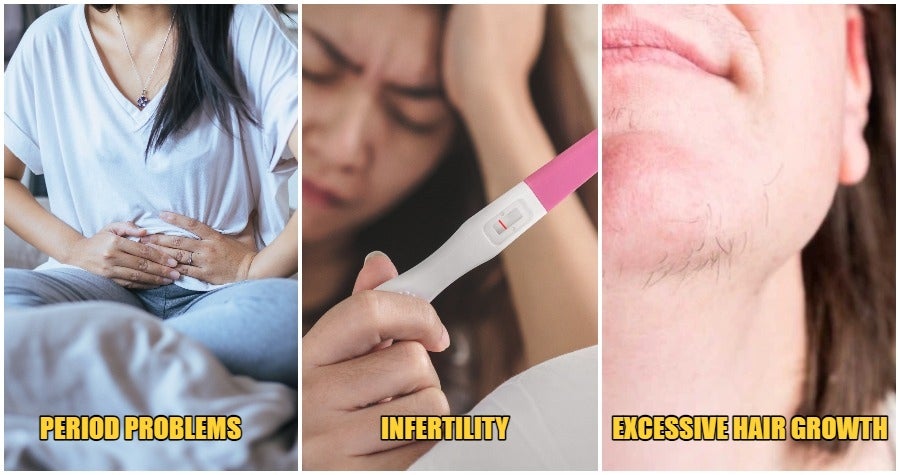How often do you hear that someone close to you is affected by PCOS?
1 out of 10 women worldwide is affected by Polycystic Ovary Syndrome (PCOS) but only 50% of PCOS women get the proper diagnosis. September PCOS (Polycystic ovary syndrome) awareness month is an effort that is federally designated to raise awareness and help improve the lives of those affected by PCOS through overcoming symptoms and changing the lifestyle that leads to this condition.
In Malaysia, a study found a high prevalence of PCOS among 12.6% of Malaysian women that signifies an emerging public health issue.
PCOS is a genetic, hormonal, metabolic, and reproductive medical condition that affects a woman’s hormone levels due to higher-than-normal amounts of male hormones (testosterone).
Stories from survivors
WORLD OF BUZZ spoke to two survivors of this condition, Jamie Indran, and Maria Natasha as they shared their personal journeys as PCOS survivors.

Finding out about PCOS
Jamie first found out about having PCOS around the age of 30 due to an inconsistent period cycle. She would bleed and spot almost every other day. The pattern would stop for a week or two but it continues after that.
“I found out at an early age but considering I grew up in a time when resources were not as easy to come by as today, I went through it the old fashion way and explored many options.”
Maria Natasha on the other hand got her menstruation late (14 years old).
“My PCOS journey started in the initial stage. I didn’t get my period regularly. So I became the poster child for PCOS at school.”
Maria’s initial doctors only mentioned symptoms of PCOS but did not diagnose her with any scans. To her frustration, they told her to not worry as it is a common occurrence but she was getting sick and tired easily. Maria was also horrified when some parents of her friends kept saying “don’t worry it will come back to normal once she gets married”.

The effects of PCOS on daily lives
For Jamie, she gained weight and felt tired and despite having proper rest. She also developed constant mood swings. She had to stop her sugar intake in the beginning as her PCOS type was insulin resistant and low progesterone.
“It’s different for each PCOS woman.”
There are four possible types of PCOS:
- Post-Pill PCOS
- Insulin Resistance
- Inflammatory PCOS
- Adrenal Driven PCOS
Maria Natasha also said that PCOS affected her as she was put on hormone regulatory medication when she was trying to get pregnant. Consequently, she cut down all sugary treats, consumed brown rice or parboiled rice that helped her with her PCOS. Over the year, she slowly changed her lifestyle and diet to incorporate more exercise.

Despite her condition, Maria did not limit herself, she constantly pushed herself for the better.
“We hiked Gunung Datuk and I was having Menorrhagia (menstrual bleeding that lasts more than 7 days). Coming down was the hardest because I had no more energy and water.”
“Once while jungle trekking, I was on Mirena-IUD so no periods for max 5 years…but this did not exclude the pain and suffering. I had to get it, if not I wouldn’t stop bleeding. It would mess up the quality of my life and mood so much and I would become so weak and drained. I would bleed for more than 4 months and keep spotting till the next full bleed.”
Only in 2017, Maria found a gynaecologist that knew her condition and the problems she faced.
“Finding a good doctor also helps. Some medical places denied me while I was suffering for months, bleeding and sobbing from being so weak. Every day was a struggle. Going out seemed like Mission Impossible. I would always plan for a change of clothes just in case. The fear of staining my outfit was constant.”
Reaction and acceptance of people around them
Jamie said that the most common reaction she got was people asking her, “what’s that?”
“I can’t blame them as there isn’t much awareness on this. Most of the time, I sense people feeling like it’s not serious even after I explain it to them.”
In addition to that, Maria said she often was flooded with advice from other PCOS survivors thinking it will work the same for all those with PCOS.
“But no! It varies for people,” she said.
Family members may understand but others assume that it is no big deal to be getting inconsistent menses. Gratefully, she said “some who truly understand and take the time to talk about it would realise how crazy and tiring it is. I was lucky to have the support of friends talking about similar symptoms that gave me encouragement and moral support.”

Women with PCOS have significantly higher rates of tension, depression, and anxiety than women without PCOS. Symptoms of PCOS include physical pain, irregular sleep, difficulty concentrating, and digestive problems.
“I had most of the symptoms and I was an anxious person too. But what I’ve learned is to listen to our bodies and know the signs.”
Coping with PCOS
Jamie said she was clueless at first but her doctors helped her manage the condition by changing her diet and encouraging exercise. Her medication was administered as well but doctors lowered her dosage as there were improvements.
“Within the first year, I managed to reduce my weight to a healthy BMI level and this has helped me manage my levels of tiredness and moods. Some days it’s easy and some days it’s not, mornings being the hardest. I like having personal space to do my own thing. I enjoy painting and find this very therapeutic. Essential oils help too.”
She also said that she has been blessed to have the support of her loved ones and she enjoys talking with girls of similar conditions as there is a mutual understanding. “I personally feel support, kindness, love, and understanding helps to cope with the condition.”
On the other hand, Maria is coping by watching her diet, exercising, gardening, having a support group in the form of family and friends, and learning to balance her mental health and mood swings. She also explained the importance of explaining symptoms and feelings to your spouse for better understanding.

Awareness level of PCOS in Malaysia
Jamie finds the awareness level of PCOS among Malaysians to be poor and it definitely needs to be made known to society.
“Every woman with PCOS is different and special. Some have it worse. It’s sad that people don’t seem to understand the battle we go through. As much as we ourselves try to educate others, it can end up being so draining trying to explain over and over again. I feel like people don’t take it as a serious condition that affects every part of a woman physically, mentally, and emotionally.“
Maria also added that not many medical professionals or the public are aware of this condition.
“I think we need to create awareness and support groups for this. Just getting the word out and getting people to talk about promoting better understanding and early diagnosis to prevent further serious illness. Medical professionals should be much more informative on the holistic treatment and lifestyle changes for PCOS survivors for them to not feel alone in this world.”
She feels that there is a need to have much more statistical proof on matters pertaining to PCOS and believes Malaysia has close to no resources to show this, as compared to other countries.
It is time women realise that there is nothing upsetting or embarrassing about PCOS. In fact, more women out there to be aware of their health conditions. Undiagnosed or untreated PCOS conditions may lead to other complications. Early identification and prevention of PCOS are important to reduce the prevalence.
What do you think of this? Let us know in the comments below.
Read Also: “The vaccinated are better protected” Almost 98% Of New Covid-19 Cases Are Category 1 & 2








































